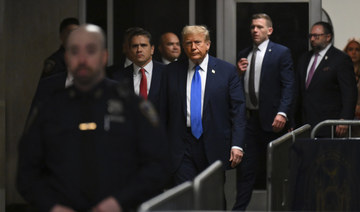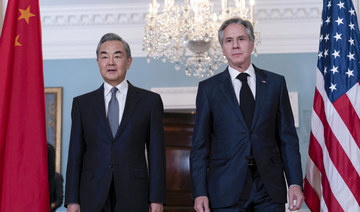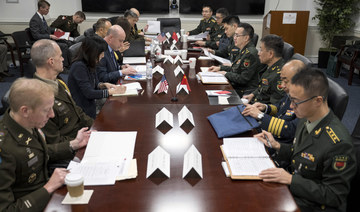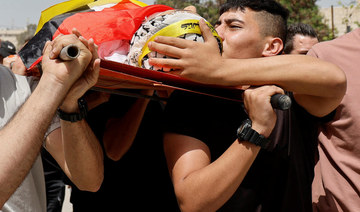The watch towers, double-locked doors and video surveillance in the Chinese camps are there “to prevent escapes.” Uighurs and other minorities held inside are scored on how well they speak the dominant Mandarin language and follow strict rules on everything down to bathing and using the toilet, scores that determine if they can leave.
“Manner education” is mandatory, but “vocational skills improvement” is offered only after a year in the camps.
Voluntary job training is the reason the Chinese government has given for detaining more than a million ethnic minorities, most of them Muslims. But a classified blueprint leaked to a consortium of news organizations shows the camps are instead precisely what former detainees have described: Forced ideological and behavioral re-education centers run in secret.
The classified documents lay out the Chinese government’s deliberate strategy to lock up ethnic minorities even before they commit a crime, to rewire their thoughts and the language they speak.
The papers also show how Beijing is pioneering a new form of social control using data and artificial intelligence. Drawing on data collected by mass surveillance technology, computers issued the names of tens of thousands of people for interrogation or detention in just one week.
Taken as a whole, the documents give the most significant description yet of high-tech mass detention in the 21st century in the words of the Chinese government itself. Experts say they spell out a vast system that targets, surveils and grades entire ethnicities to forcibly assimilate and subdue them — especially Uighurs, a predominantly Muslim Turkic minority of more than 10 million people with their own language and culture.
“They confirm that this is a form of cultural genocide,” said Adrian Zenz, a leading security expert on the far western region of Xinjiang, the Uighur homeland. “It really shows that from the onset, the Chinese government had a plan.”
Zenz said the documents echo the aim of the camps as outlined in a 2017 report from a local branch of the Xinjiang Ministry of Justice: To “wash brains, cleanse hearts, support the right, remove the wrong.”
China has struggled for decades to control Xinjiang, where the Uighurs have long resented Beijing’s heavy-handed rule. After the 9/11 attacks in the United States, Chinese officials began justifying harsh security measures and religious restrictions as necessary to fend off terrorism, arguing that young Uighurs were susceptible to the influence of Islamic extremism. Hundreds have died since in terror attacks, reprisals and race riots, both Uighurs and Han Chinese.
In 2014, Chinese President Xi Jinping launched what he called a “People’s War on Terror” when bombs set off by Uighur militants tore through a train station in Urumqi, the capital of Xinjiang, just hours after he concluded his first state visit there.
“Build steel walls and iron fortresses. Set up nets above and snares below,” state media cited Xi as saying. “Cracking down severely on violent terrorist activities must be the focus of our current struggle.”
In 2016, the crackdown intensified dramatically after Xi named Chen Quanguo, a hard-line official transferred from Tibet, as Xinjiang’s new head. Most of the documents were issued in 2017, as Xinjiang’s “War on Terror” morphed into an extraordinary mass detention campaign using military-style technology.
The practices largely continue today. The Chinese government says they work.
“Since the measures have been taken, there’s no single terrorist incident in the past three years,” said a written response from the Chinese Embassy in the United Kingdom. “Xinjiang is much safer....The so-called leaked documents are fabrication and fake news.”
The statement said that religious freedom and the personal freedom of detainees was “fully respected” in Xinjiang.
The documents were given to the International Consortium of Investigative Journalists by an anonymous source. The ICIJ verified them by examining state media reports and public notices from the time, consulting experts, cross-checking signatures and confirming the contents with former camp employees and detainees.
They consist of a notice with guidelines for the camps, four bulletins on how to use technology to target people, and a court case sentencing a Uighur Communist Party member to 10 years in prison for telling colleagues not to say dirty words, watch porn or eat without praying.
The documents were issued to rank-and-file officials by the powerful Xinjiang Communist Party Political and Legal Affairs Commission, the region’s top authority overseeing police, courts and state security. They were put out under the head official at the time, Zhu Hailun, who annotated and signed some personally.
The documents confirm from the government itself what is known about the camps from the testimony of dozens of Uighurs and Kazakhs, satellite imagery and tightly monitored visits by journalists to the region.
Erzhan Qurban, an ethnic Kazakh who moved back to Kazakhstan, was grabbed by police on a trip back to China to see his mother and accused of committing crimes abroad. He protested that he was a simple herder who had done nothing wrong. But for the authorities, his time in Kazakhstan was reason enough for detention.
Qurban told the AP he was locked in a cell with 10 others last year and told not to engage in “religious activities” like praying. They were forced to sit on plastic stools in rigid postures for hours at a time. Talk was forbidden, and two guards kept watch 24 hours a day. Inspectors checked that nails were short and faces trimmed of mustaches and beards, traditionally worn by pious Muslims.
Those who disobeyed were forced to squat or spend 24 hours in solitary confinement in a frigid room.
“It wasn’t education, it was just punishment,” said Qurban, who was held for nine months. “I was treated like an animal.”
___
WHO GETS ROUNDED UP AND HOW
On February 18, 2017, Zhu, the Han Chinese official who signed the documents, stood in chilly winter weather atop the front steps of the capital’s city hall, overlooking thousands of police in black brandishing rifles.
“With the powerful fist of the People’s Democratic Dictatorship, all separatist activities and all terrorists shall be smashed to pieces,” Zhu announced into a microphone.
With that began a new chapter in the state’s crackdown. Police called Uighurs and knocked on their doors at night to take them in for questioning. Others were stopped at borders or arrested at airports.
In the years since, as Uighurs and Kazakhs were sent to the camps in droves, the government built hundreds of schools and orphanages to house and re-educate their children. Many of those who fled into exile don’t even know where their children or loved ones are.
The documents make clear that many of those detained have not actually done anything. One document explicitly states that the purpose of the pervasive digital surveillance is “to prevent problems before they happen” — in other words, to calculate who might rebel and detain them before they have a chance.
This is done through a system called the Integrated Joint Operations Platform or IJOP, designed to screen entire populations. Built by a state-owned military contractor, the IJOP began as an intelligence-sharing tool developed after Chinese military theorists studied the US army’s use of information technology in Iraq and Afghanistan.
“There’s no other place in the world where a computer can send you to an internment camp,” said Rian Thum, a Xinjiang expert at the University of Nottingham. “This is absolutely unprecedented.”
The IJOP spat out the names of people considered suspicious, such as thousands of “unauthorized” imams not registered with the Chinese government, along with their associates. Suspicious or extremist behavior was so broadly defined that it included going abroad, asking others to pray or using cell phone apps that cannot be monitored by the government.
The IJOP zoomed in on users of “Kuai Ya,” a mobile application similar to the iPhone’s Airdrop, which had become popular in Xinjiang because it allows people to exchange videos and messages privately. One bulletin showed that officials identified more than 40,000 “Kuai Ya” users for investigation and potential detention; of those, 32 were listed as belonging to “terrorist organizations.”
“They’re scared people will spread religion through ‘Kuai Ya,’” said a man detained after police accused him of using the app. He spoke to the AP on condition of anonymity to protect himself and his family. “They can’t regulate it....So they want to arrest everyone who’s used ‘Kuai Ya’ before.”
The system also targeted people who obtained foreign passports or visas, reflecting the government’s fear of Islamic extremist influences from abroad and deep discomfort with any connection between the Uighurs and the outside world. Officials were asked to verify the identities even of people outside the country, showing how China is casting its dragnet for Uighurs far beyond Xinjiang.
In recent years, Beijing has put pressure on countries to which Uighurs have fled, such as Thailand and Afghanistan, to send them back to China. In other countries, state security has also contacted Uighurs and pushed them to spy on each other. For example, a restaurateur now in Turkey, Qurbanjan Nurmemet, said police contacted him with videos of his son strapped to a chair and asked him for information on other Uighurs in Turkey.
Despite the Chinese government’s insistence that the camps are vocational training centers for the poor and uneducated, the documents show that those rounded up included party officials and university students.
After the names were collected, lists of targeted people were passed to prefecture governments, who forwarded them to district heads, then local police stations, neighbor watchmen, and Communist Party cadres living with Uighur families.
Some former detainees recalled being summoned by officers and told their names were listed for detention. From there, people were funneled into different parts of the system, from house arrest to detention centers with three levels of monitoring to, at its most extreme, prison.
Experts say the detentions are a clear violation of China’s own laws and constitution. Maggie Lewis, a professor of Chinese law at Seton Hall University, said the Communist Party is circumventing the Chinese legal system in Xinjiang.
“Once you’re stamped as an enemy, the gloves go off,” she said. “They’re not even trying to justify this legally....This is arbitrary.”
The detention campaign is sweeping. A bulletin notes that in a single week in June 2017, the IJOP identified 24,612 “suspicious persons” in southern Xinjiang, with 15,683 sent to “education and training,” 706 to prison and 2,096 to house arrest. It is unknown how typical this week might be. Local officials claim far less than a million are in “training,” but researchers estimate up to 1.8 million have been detained at one point or another.
The bulletins stress that relationships must be scrutinized closely, with those interrogated pushed to report the names of friends and relatives. Mamattursun Omar, a Uighur chef arrested after working in Egypt, was interrogated in four detention facilities over nine months in 2017. Omar told the AP that police asked him to verify the identities of other Uighurs in Egypt.
Eventually, Omar says, they began torturing him to make him confess that Uighur students had gone to Egypt to take part in jihad. They strapped him to a contraption called a “tiger chair,” shocked him with electric batons, beat him with pipes and whipped him with computer cords.
“I couldn’t take it anymore,” Omar said. “I just told them what they wanted me to say.”
Omar gave the names of six others who worked at a restaurant with him in Egypt. All were sent to prison.
___
WHAT HAPPENS INSIDE THE CAMPS
The documents also detail what happens after someone is sent to an “education and training center.”
Publicly, in a recent white paper, China’s State Council said “the personal freedom of trainees at the education and training centers is protected in accordance with the law.” But internally, the documents describe facilities with police stations at the front gates, high guard towers, one-button alarms and video surveillance with no blind spots.
Detainees are only allowed to leave if absolutely necessary, for example because of illness, and even so must have somebody “specially accompany, monitor and control” them. Bath time and toilet breaks are strictly managed and controlled “to prevent escapes.” And cell phones are strictly forbidden to stop “collusion between inside and outside.”
“Escape was impossible,” said Kazakh kingergarten administrator Sayragul Sauytbay, a Communist Party member who was abducted by police in October 2017 and forced to become a Mandarin camp instructor. “In every corner in every place there were armed police.”
Sauytbay called the detention center a “concentration camp...much more horrifying than prison,” with rape, brainwashing and torture in a “black room” were people screamed. She and another former prisoner, Zaomure Duwati, also told the ICIJ detainees were given medication that made them listless and obedient, and every move was surveilled.
AP journalists who visited Xinjiang in December 2018 saw patrol towers and high walls lined with green barbed wire fencing around camps. One camp in Artux, just north of Kashgar, sat in the middle of a vast, empty, rocky field, and appeared to include a police station at the entrance, workshops, a hospital and dormitories, one with a sign reading “House of Workers” in Chinese.
Recent satellite imagery shows that guard towers and fencing have been removed from some facilities, suggesting the region may have been softening restrictions in response to global criticism. Shohrat Zakir, the governor of Xinjiang, said in March that those detained can now request time and go home on weekends, a claim the AP could not independently verify.
The first item listed as part of the curriculum is ideological education, a bold attempt to change how detainees think and act. It is partly rooted in the ancient Chinese belief in transformation through education — taken before to terrifying extremes during the mass thought reform campaigns of Mao Zedong.
“It’s the dark days of the Cultural Revolution, except now it’s powered by high-tech,” said Zenz, the researcher.
By showing students the error of their former ways, the centers are supposed to promote “repentance and confession,” the directive said. For example, Qurban, the Kazakh herder, was handcuffed, brought to an interview with a Han Chinese leader and forced to acknowledge that he regretted visiting abroad.
The indoctrination goes along with what is called “manner education,” where behavior is dictated down to ensuring “timely haircuts and shaves,” “regular change of clothes” and “bathing once or twice a week.” The tone, experts say, echoes a general perception by the Han Chinese government that Uighurs are prone to violence and need to be civilized — in much the same way white colonialists treated indigenous people in the US, Canada and Australia.
“It’s a similar kind of savior mentality — that these poor Uighurs didn’t understand that they were being led astray by extremists,” said Darren Byler, a scholar of Uighur culture at the University of Washington. “The way they think about Uighurs in general is that they are backward, that they’re not educated....these people are unhygienic and need to be taught how to clean themselves.”
Students are to be allowed a phone conversation with relatives at least once a week, and can meet them via video at least once a month, the documents say. Trainers are told to pay attention to “the ideological problems and emotional changes that arise after family communications.”
Mandarin is mandated. Beijing has said “the customs of all ethnic groups and the right to use their spoken and written languages are fully protected at the centers.” But the documents show that in practice, lessons are taught in Mandarin, and it is the language to be used in daily communication.
A former staffer at Xinjiang TV now in Europe was also selected to become a Mandarin teacher during his month-long detention in 2017. Twice a day, detainees were lined up and inspected by police, and a few were questioned in Mandarin at random, he told the AP. Those who couldn’t respond in Mandarin were beaten or deprived of food for days. Otherwise, speaking was forbidden.
One day, the former teacher recalled, an officer asked an old farmer in Mandarin whether he liked the detention center. The man apologized in broken Mandarin and Uighur, saying it was hard for him to understand because of his age. The officer strode over and struck the old man’s head with a baton. He crumpled to the ground, bleeding.
“They didn’t see us as humans,” said the former teacher, who declined to provide his name out of fear of retribution against his family. “They treated us like animals — like pigs, cows, sheep.”
Detainees are tested on Mandarin, ideology and discipline, with “one small test per week, one medium test per month, and one big test per season,” the documents state. These test scores feed into an elaborate point system.
Detainees who do well are to be rewarded with perks like family visits, and may be allowed to “graduate” and leave. Detainees who do poorly are to be sent to a stricter “management area” with longer detention times. Former detainees told the AP that punishments included food deprivation, handcuffing, solitary confinement, beatings and torture.
Detainees’ scores are entered in the IJOP. Students are sent to separate facilities for “intensive skills training” only after at least one year of learning ideology, law and Mandarin.
After they leave, the documents stipulate, every effort should be made to get them jobs. Some detainees describe being forced to sign job contracts, working long hours for low pay and barred from leaving factory grounds during weekdays.
Qurban, the Kazakh herder, said after nine months in the camp, a supervisor came to tell him he was “forgiven” but must never tell what he had seen. After he returned to his village, officials told him he had to work in a factory.
“If you don’t go, we’ll send you back to the center,” an official said.
Qurban went to a garment factory, which he wasn’t allowed to leave. After 53 days stitching clothes, he was released. After another month under house arrest, he finally was allowed to return to Kazakhstan and see his children. He received his salary in cash: 300 Chinese yuan, or just under $42.
Long an ordinary herder who thought little of politics, Qurban used to count many Han Chinese among his friends. Now, he said, he’s begun to hate them.
“I’ve never committed a crime, I’ve never done anything wrong,” he said. “It was beyond comprehension why they put me there.”
Secret documents reveal how China mass detention camps work
Secret documents reveal how China mass detention camps work
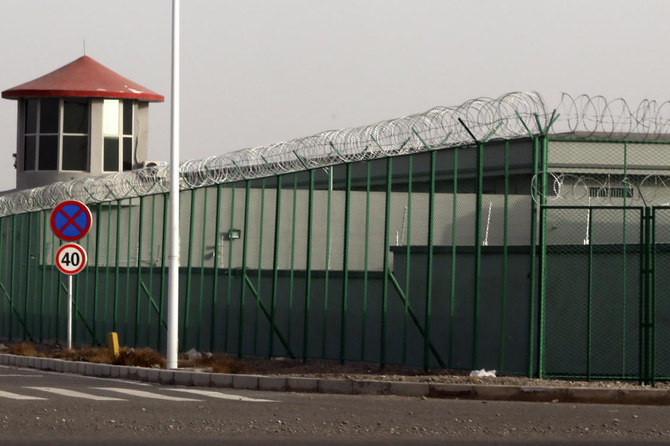
- Uighurs and other minorities held inside are scored on how well they speak the dominant Mandarin language and follow strict rules
- The classified documents lay out the Chinese government’s deliberate strategy to lock up ethnic minorities even before they commit a crime
Wave of pro-Palestinian campus protests in US meets forceful response
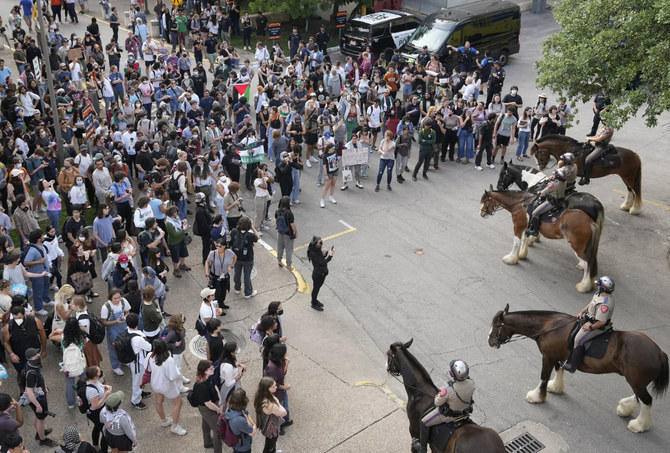
- Fresh clashes between police and students opposed to Israel’s war in Gaza broke out on Thursday
- Questions abound over forceful methods being used to shut down intensifying protests
NEW YORK: Fresh clashes between police and students opposed to Israel’s war in Gaza broke out on Thursday, raising questions about forceful methods being used to shut down protests that have intensified since mass arrests at Columbia University last week.
Over the past two days, law enforcement at the behest of college administrators have deployed Tasers and tear gas against students protesters at Atlanta’s Emory University, activists say, while officers clad in riot gear and mounted on horseback have swept away demonstrations at the University of Texas in Austin.
At Columbia, the epicenter of the US protest movement, university officials are locked in a stalemate with students over the removal of a tent encampment set up two weeks ago as a protest against the Israeli offensive.
The administration, which has already allowed an initial deadline for an agreement with students to lapse, has given protesters until Friday to strike a deal.
Other universities appear determined to prevent similar, long-running demonstrations to take root, opting to work with police to shut them down quickly and in some cases, with force.
Overall, more than 530 arrests have been made in the last week across major US universities in relation to protests over Gaza, according to a Reuters tally. University authorities have said the demonstrations are often unauthorized and called on police to clear them.
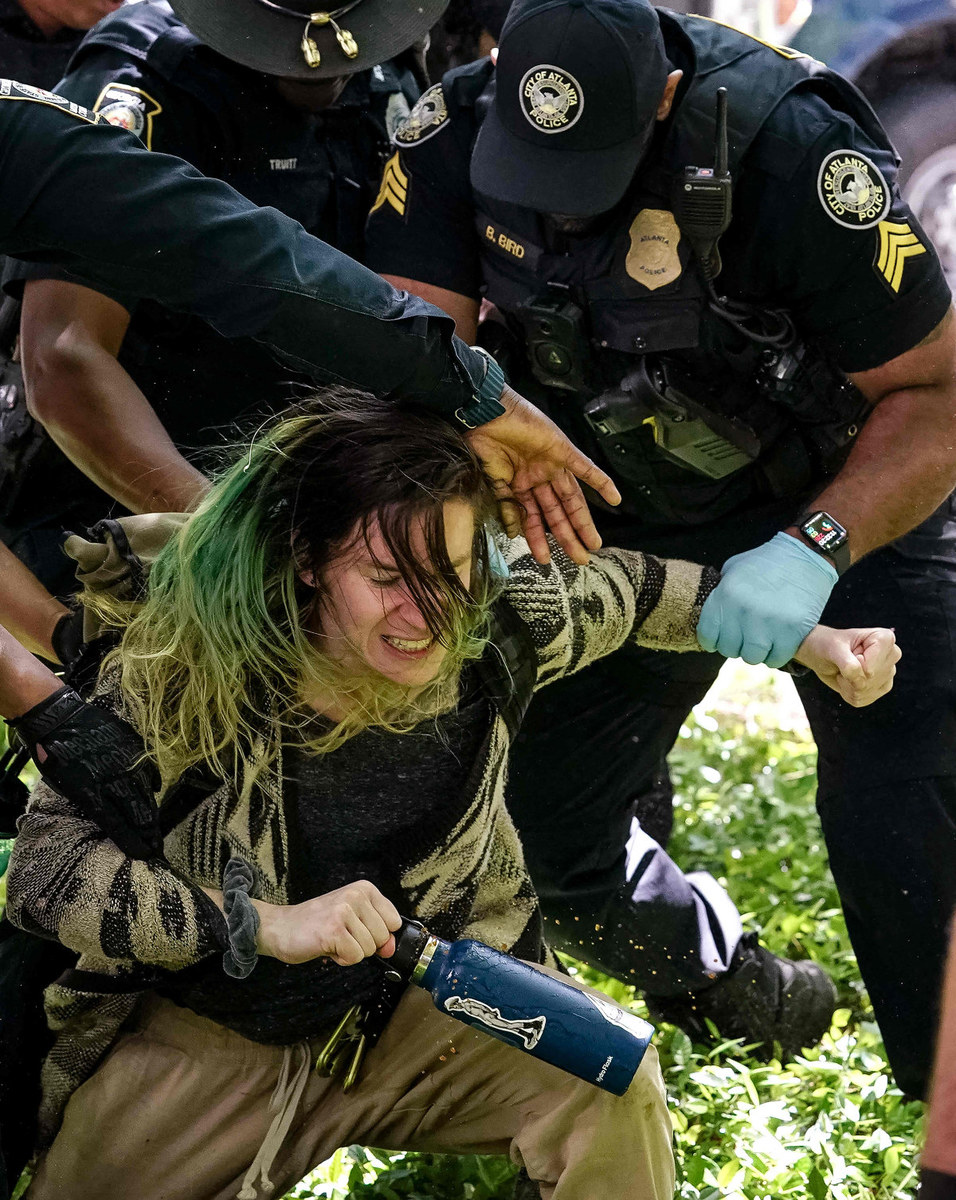
At Emory, police detained at least 15 people on its Atlanta campus, according to local media, after protesters began erecting a tent encampment in an attempt to emulate a symbol of vigilance employed by protesters at Columbia and elsewhere.
The local chapter of the activist group Jewish Voice for Peace said officers used tear gas and Tasers to dispense the demonstration and take some protesters into custody.
Video footage aired on FOX 5 Atlanta showed a melee breaking out between officers and some protesters, with officers using what appeared to be a stun gun to subdue a person and others wrestling other protesters to the ground and leading them away.
“Several dozen protesters trespassed into Emory University’s campus early Thursday morning and set up tents,” the school wrote in response to an emailed request for comment. It described the protesters as “activists attempting to disrupt our university,” but did not comment directly on the reports of violence.
Atlanta police did not immediately respond to inquiries about the number of protesters who were detained or about reports over the use of tear gas and stun guns.
Similar scenarios unfolded on the New Jersey campus of Princeton University where officers swarmed a newly-formed encampment, video footage on social media showed.
Boston police earlier forcibly removed a pro-Palestinian encampment set up by Emerson College, arresting more than 100 people, media accounts and police said. The latest clashes came a day after police in riot gear and on horseback descended on hundreds of student protesters at the University of Texas at Austin and arrested dozens of them.
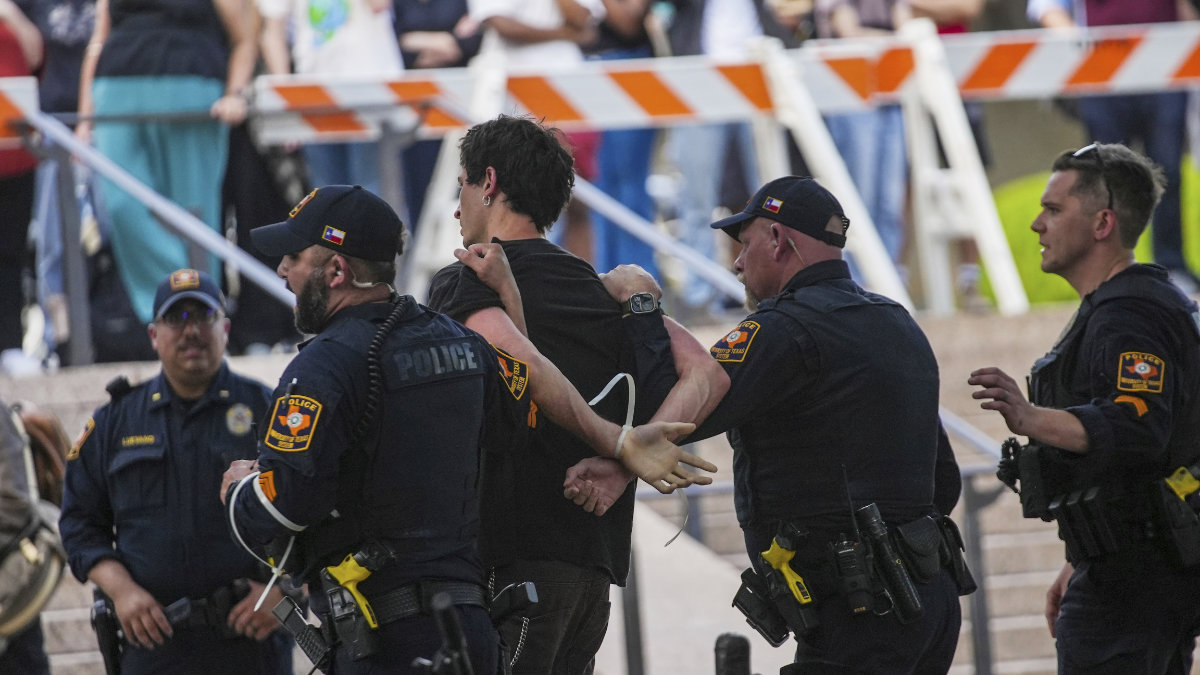
But prosecutors on Thursday dropped charges against most of the 60 people taken into custody, mostly on misdemeanor charges of criminal trespassing and disorderly conduct, and said they would proceed with only 14 of those cases.
In dropping the charges, the Travis County district attorney cited “deficiencies in the probable cause affidavits.”
‘Alarming reports’
Human Rights Watch and the American Civil Liberties Union have condemned the arrest of protesters and urged authorities to respect their free speech rights.
But some Republicans in Congress have accused university administrators of allowing Jewish students to be harassed, putting increasing pressure on schools to tightly control any demonstrations and to block any semi-permanent encampment.
US Education Secretary Miguel Cardona on Thursday said his department was closely monitoring the protests, including what he called “very alarming reports of antisemitism.”
In response, activist groups have strongly denied that the protests are antisemitic. Their aim is to pressure universities from divesting from companies that contribute to the Israeli military actions in Gaza, they say.
Even so, protest leaders have acknowledged that hateful rhetoric has been directed at Jewish students, but insist that people who tried to infiltrate and malign their movement are responsible for any harassment.

Friday deadline at Columbia
At Columbia, officials have given protesters until 4 a.m. on Friday to reach an agreement with the university on dismantling dozens of tents set up on the New York City campus in a protest that started a week ago.
An initial deadline of midnight Tuesday came and went without an agreement, but administrators extended it for 48 hours, citing progress in the talks.
The university already tried to shut the protest down by force. On April 18, Columbia President Minouche Shafik took the unusual move of asking police to enter the campus, drawing the ire of many rights groups, students and faculty.
More than 100 people were arrested and the tents were removed from the main lawn. But within a few days, the encampment was back in place, and the university’s options appeared to narrow.
Protesters have vowed to keep the protests going until their universities agree to disclose and divest any financial holdings that might support the war in Gaza, and grant amnesty to students suspended from school during the demonstrations.
Student protesters have also demanded that the US government rein in Israeli strikes on civilians in Gaza, which have killed more than 34,000 people, according to Palestinian health authorities. Israel is retaliating against an Oct. 7 Hamas attack that killed 1,200 people and led to 253 taken hostage, according to Israeli tallies.
India begins voting in second phase of election as Modi vs Gandhi campaign heats up
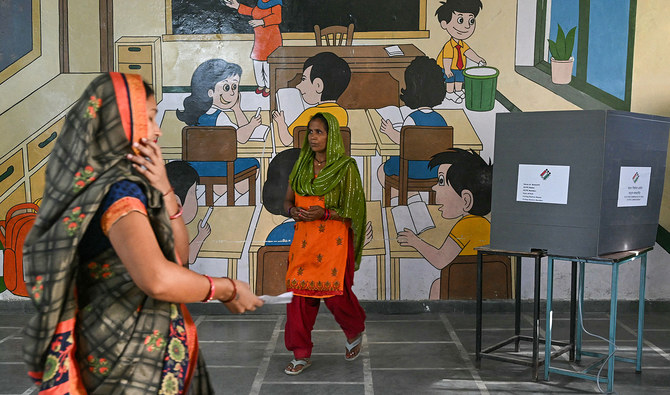
- Almost one billion people eligible to vote in seven-phase general elections that began on April 19 and concludes on June 1
- Modi is seeking record third straight term on the back of economic record, welfare measures, Hindu nationalism
BENGALURU/KOTTAYAM/MATHURA: India began voting on Friday in the second phase of the world’s biggest election, as Prime Minister Narendra Modi and his rivals raise the pitch of the campaign by focusing on hot-button issues such as religious discrimination, affirmative action and taxes.
Almost one billion people are eligible to vote in the seven-phase general elections that began on April 19 and concludes on June 1, with votes set to be counted on June 4.
Modi is seeking a record-equalling third straight term on the back of his economic record, welfare measures, national pride, Hindu nationalism and personal popularity. Surveys suggest he will easily win a comfortable majority.
His challengers have formed an alliance of more than two dozen parties and are promising greater affirmative action, more handouts and an end to what they call Modi’s autocratic rule.
Friday’s polling will be held for 88 of the total 543 seats in the lower house of parliament with 160 million people eligible to vote. It will be spread across 13 states and federal territories in the world’s most populous country.
More than half of those 88 seats are in the southern states of Kerala and Karnataka and the northwestern state of Rajasthan.
The campaign has changed tack since the first phase and become heated as Modi and the main opposition Congress party have faced off on communal issues with Modi accusing Congress of favoring minority Muslims, aiming to dilute affirmative action and planning to impose inheritance tax.
“Congress, which used to make noise in the name of the Constitution, has now been badly exposed for its hidden agenda,” Modi posted on X late on Thursday.
Congress has denied the charges and said Modi is distracting voters from real issues such as unemployment, price rise and rural distress and fears losing.
RAHUL GANDHI IN THE FRAY
“We spoke to you, we heard what was on your mind and drafted a revolutionary manifesto,” Congress leader Rahul Gandhi said in a video message on the eve of the vote. “This has been drafted by the Congress party but it is your voice.”
Gandhi, former Congress president and the face of the party, is among the 1200 candidates in the fray on Friday.
He is seeking re-election from Wayanad in Kerala and faces Annie Raja of the Communist Party of India (CPI) and BJP’s K. Surendran, among others, in the Left Front-ruled state.
In 2019, Gandhi defeated the CPI candidate by more than 400,000 votes, the highest margin in Kerala, although he lost his second seat to BJP in the family bastion of Amethi in north India. India allows a candidate to contest from more than one seat but they can retain only one if they win from more.
Congress slumped to a historic low when it was swept out of power by BJP in 2014 and won its second-lowest number of 52 seats in 2019, with Kerala contributing the highest of 15.
The party is also expected to do better in Karnataka where it won just one of 28 seats in 2019 but gained strength and defeated BJP in state elections last year.
It is still seen to be struggling nationally as bickering within the opposition alliance it leads and graft cases against some leaders has hobbled its challenge to Modi.
The Election Commission and political parties have been worried about voter turnout due to the summer heat and wedding season in some parts of the country with turnout falling to around 65 percent in the first phase from nearly 70 percent in 2019.
The poll panel has increased appeals for voter participation since, asking them to “vote with responsibility and pride.”
Ex-tabloid publisher testifies he scooped up possibly damaging tales to shield his old friend Trump
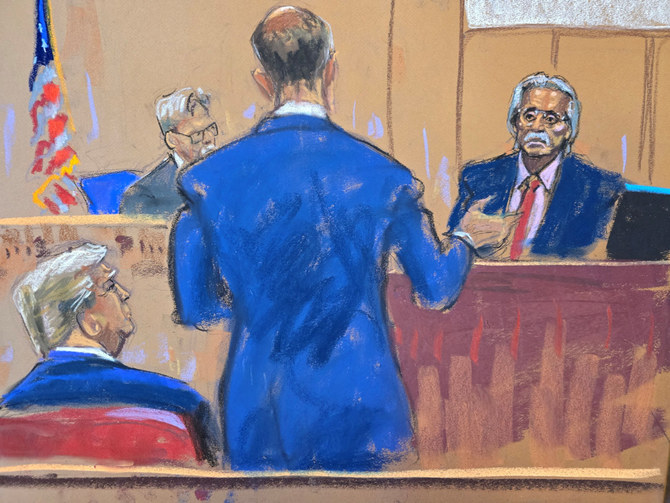
- David Pecker, publisher of the tabloid National Enquirer, has testified that his publication helped buy stories about Trump's extramarital affairs to keep them from getting out
- His testimony was a critical building block for the prosecution’s theory that their partnership was a way to illegally influence the 2016 presidential election
NEW YORK: As Donald Trump was running for president in 2016, his old friend at the National Enquirer was scooping up potentially damaging stories about the candidate and paying out tens of thousands of dollars to keep them from the public eye.
But when it came to the seamy claims by porn performer Stormy Daniels, David Pecker, the tabloid’s longtime publisher, said he put his foot down.
“I am not paying for this story,” he told jurors Thursday at Trump’s hush money trial, recounting his version of a conversation with Trump’s former lawyer Michael Cohen about the catch-and-kill scheme that prosecutors alleged amounted to interference in the race. Pecker was already $180,000 in the hole on other Trump-related stories by the time Daniels came along, at which point, he said, “I didn’t want to be involved in this.”
Pecker’s testimony was a critical building block for the prosecution’s theory that their partnership was a way to illegally influence the 2016 presidential election. The Manhattan district attorney is seeking to elevate the gravity of the history-making first trial of a former American president and the first of four criminal cases against Trump to reach a jury.
Trump’s lawyers also began their cross-examination of Pecker, using the time to question his memory of years-old events and to suggest his account had evolved over time.
But the hush money trial was just one of the consequential legal matters facing the Republican presidential candidate on Thursday.
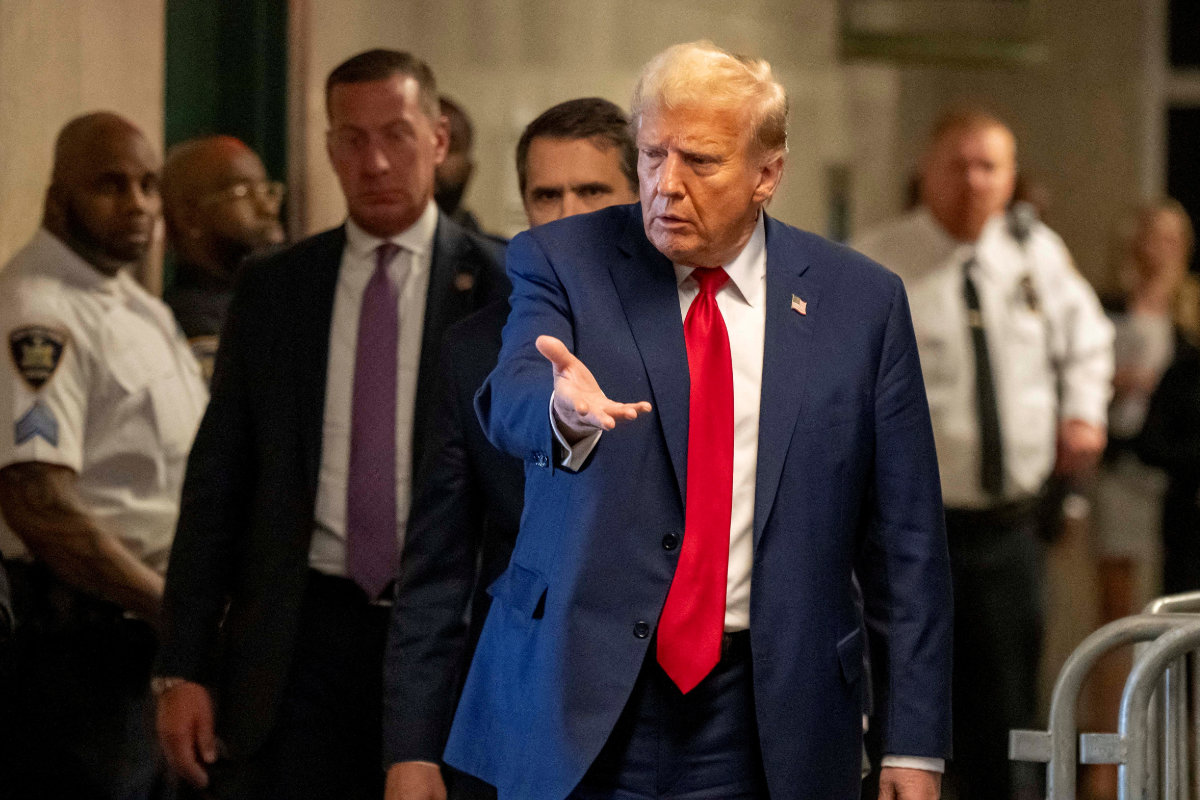
The US Supreme Court also heard arguments over whether Trump should be immune from criminal prosecution while he was the president, stemming from federal charges over his efforts to reverse his 2020 election loss to Joe Biden. The high court justices appeared likely to reject his claims of absolute immunity, though it seemed very possible that trial could be delayed beyond November’s election.
Trump’s many legal problems collided this week. The hush money case includes a looming decision on whether he violated a gag order and should be held in contempt. His former lawyers and associates were indicted in a 2020 election-related scheme in Arizona. And a New York judge rejected a request for a new trial in a defamation case that found Trump liable for $83.3 million in damages.
But the former president has a long history of emerging unscathed from sticky situations — if not becoming even more popular.
The Supreme Court’s decision will have lasting implications for future presidents, because the justices were seeking to answer the never-before-asked question of whether and to what extent does a former president enjoy immunity from prosecution for conduct during his time in office. But it may not impact the New York City case, which hinges mostly on Trump’s conduct as a presidential candidate in 2016 — not as a president.
Trump had asked to skip his New York criminal proceedings for the day so he could sit in on the Supreme Court’s special session, but that request was denied by Judge Juan M. Merchan, who is overseeing Trump’s trial on 34 felony counts of falsifying business records in connection with the hush money payments, which involved buying the rights to someone’s story but never publishing it.
“I think the Supreme Court has a very important argument before it today,” Trump said outside the courtroom. “I should be there.”
Instead, he sat at the defense table in a Manhattan courtroom with his lawyers, listening intently to Pecker testify how he and his publication parlayed rumor-mongering into splashy stories that smeared Trump’s opponents and, just as crucially, leveraged his connections to suppress unflattering coverage.
Trump has maintained he is not guilty of any of the charges, and says the stories that were bought and squelched were false.
“There is no case here. This is just a political witch hunt,” he said before court in brief comments to reporters.
As Pecker testified in a calm, cooperative tone about risque tales and secret dealings, the atmosphere in the utilitarian 1940s courtroom was one of quiet attentiveness. Two Secret Service agents were stationed in the first row of the courtroom gallery directly behind Trump. Ten court officers stood around the room. Jurors intently listened, and some took notes.
Pecker recalled that the publication bought a sordid tale from a New York City doorman and purchased accusations of an extramarital affair with former Playboy model Karen McDougal to prevent the claims from getting out. There was some talk of reimbursement from Trump’s orbit, but Pecker was ultimately never paid.
The breaking point came with Daniels, who was eventually paid by Cohen to keep quiet over her claim of a 2006 sexual encounter with Trump. The ex-president denies it happened.
Pecker recalled to the jury that he was dining with his wife the night after the public learned of the infamous 2005 “Access Hollywood” tape in which Trump discussed grabbing women sexually without permission, when then-editor Dylan Howard called with an urgent matter.
Howard said he heard from Daniels’ representatives that she was trying to sell her story and that the tabloid could acquire it for $120,000, Pecker told jurors. Pecker was tapped out; he told Cohen as much.
At the same time, Pecker advised that someone — just not him — should do something to prevent the story from going public.
“I said to Michael, ‘My suggestion to you is that you should buy the story, and you should take it off the market because if you don’t and it gets out, I believe the boss will be very angry with you.’”
Cohen followed his advice.
Pecker testified that Trump later invited him to a White House dinner in July 2017 to thank him for helping the campaign. The ex-publisher said Trump encouraged him to bring anyone he wanted, recounting that the then-president told him, “It’s your dinner.”
Pecker said that he and Howard, as well as some of his other business associates, posed for photos with Trump in the Oval Office. Pecker said others at the dinner included Trump son-in-law Jared Kushner and press adviser Sean Spicer.
At one point during the evening, Pecker said Trump asked him for an update on Karen McDougal.
“How’s Karen doing?” he recalled Trump saying as they walked past the Rose Garden from the Oval Office to the dining room.
“I said she’s doing well, she’s quiet, everything’s going good,” Pecker testified.
But months later, in March 2018, the president became furious when McDougal gave an interview to CNN’s Anderson Cooper, Pecker testified.
“I thought you had and we had an agreement with Karen McDougal that she can’t give any interviews or be on any TV channels,” Trump told Pecker by phone, the former National Enquirer publisher said.
He said he explained to the then-president that the agreement had been changed to allow her to speak to the press after a November 2016 Wall Street Journal article about the tabloid’s $150,000 payout to McDougal.
“Mr. Trump got very aggravated when he heard that I amended it, and he couldn’t understand why,” Pecker told jurors.
Later, Trump defense attorney Emil Bove opened his cross-examination by grilling Pecker on his recollection of specific dates and meanings. He appeared to be laying further groundwork for the defense’s argument that any dealings Trump had with the National Enquirer publisher were intended to protect himself, his reputation and his family — not his campaign.
In other developments, prosecutors argued Trump again violated a gag order, all while waiting to hear whether he would be held in contempt on other suspected violations. Merchan has barred the GOP leader from making public statements about witnesses, jurors and others connected to the case. He set a hearing for next Thursday on the new claims.
Trump was dismissive about the looming decision. When asked by reporters if he would pay fines if ordered, he replied, “Oh, I have no idea.” He then said, “They’ve taken my constitutional right away with a gag order.”
A conviction by the jury would not preclude Trump from becoming president again, but because it is a state case, he would not be able to pardon himself if found guilty. The charge is punishable by up to four years in prison — though it’s not clear if the judge would seek to put him behind bars.
Xi tells Blinken US, China must be ‘partners, not rivals’: state media
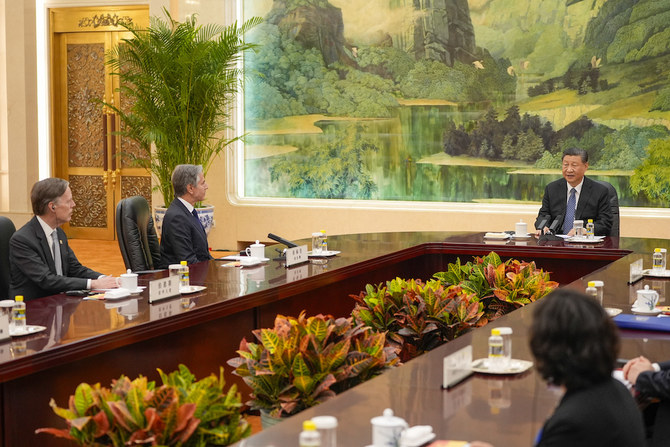
BEIJING: Chinese President Xi Jinping on Friday told top US diplomat Antony Blinken that the world’s two biggest economies should be “partners, not rivals,” adding that there were a “number of issues” to be resolved in their relations.
“The two countries should be partners, not rivals,” Xi said, according to state broadcaster CCTV, adding: “There are still a number of issues that need to be resolved, and there is still room for further efforts.”
China urged Blinken to address rising disagreements or risk a “downward spiral” between the two powers as talks opened in Beijing.
Blinken, paying his second visit to the rival country in less than a year, voiced hope for progress but said he would directly raise areas of difference, which are expected to include Russia, Taiwan and trade.
Chinese Foreign Minister Wang Yi, receiving Blinken at the Diaoyutai state guesthouse in the capital’s ancient gardens, said relations between the world’s two largest economies were “beginning to stabilize” after leaders Joe Biden and Xi Jinping met at a November summit.
“But at the same time, the negative factors in the relationship are still increasing and building,” Wang said.
“The relationship is facing all kinds of disruptions. China’s legitimate development rights have been unreasonably suppressed and our core interests are facing challenges,” he said.
“Should China and the United States keep in the right direction of moving forward with stability, or return to a downward spiral?
“This is a major question before our two countries and tests our sincerity and ability.”
Blinken’s aides previously said he would address a range of concerns including China’s support for Russia, which has rapidly rebuilt its military base two years into its invasion of Ukraine.
As he opened the meeting with Wang, Blinken said he would be “very clear, very direct,” but added: “I hope we make some progress on the issues our presidents agreed” on.
The two countries should be as “clear as possible about the areas where we have differences — at the very least to avoid misunderstandings, to avoid miscalculations,” Blinken said.
“That really is a shared responsibility that we have not only for our own people, but for people around the world.”
France threatens new sanctions against West Bank settlers
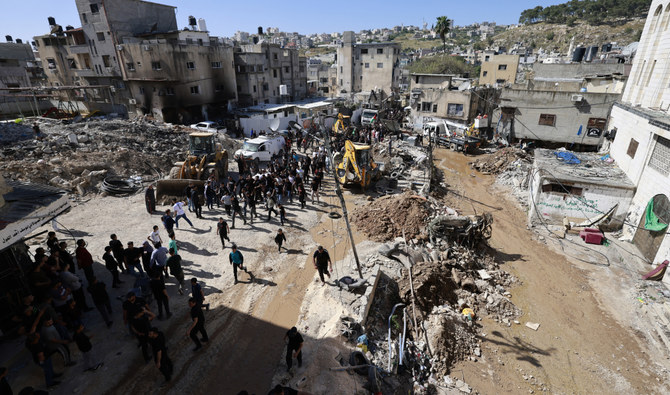
- In February, 28 ‘extremist Israeli settlers’ were banned from entering French territory
- At least 488 Palestinians have been killed by Israeli troops or settlers in the West Bank since October 7, according to Palestinian officials
PARIS: France is considering extending sanctions on Israeli settlers behind violence against Palestinian civilians in the occupied West Bank, President Emmanuel Macron’s office said he spoke with Jordan’s King Abdullah II.
The two leaders “firmly condemned recent Israeli announcements about settlements” in the West Bank, “which are contrary to international law,” Macron’s office said in a statement.
Tensions have mounted in the occupied territories since the Hamas October 7 attack on Israel that set off the Gaza war. At least 488 Palestinians have been killed by Israeli troops or settlers in the West Bank since October 7, according to Palestinian officials.
In February, 28 “extremist Israeli settlers” were banned from entering French territory. Last week the European Union imposed sanctions on four Israeli settlers and two settler organizations for violence against Palestinians in the West Bank and Jerusalem.
Since the start of the year, Israeli authorities have declared nearly 1,100 hectares (2,720 acres) of the West Bank to be “state land” — twice as much as in the previous record year in 1999, according to the settlement watchdog Peace Now.
The status gives the government full control over how the land is used, inevitably leading it to being declared off-limits to Palestinians.
Some 490,000 Israeli settlers now live in the West Bank alongside three million Palestinians.
Macron and King Abdullah also spoke about the “catastrophic humanitarian situation in Gaza” and expressed “great concern about the perspective of an Israeli offensive on Rafah, where more than 1.5 million people are seeking refuge, and reiterated their opposition to such an operation,” the statement said.
“The two also insisted on the necessity of an immediate and durable ceasefire to allow massive deliveries of urgent aid and the protection of civilian populations,” it added.
Macron also “repeated that the liberation of hostages held by Hamas was an absolute priority for France.”




